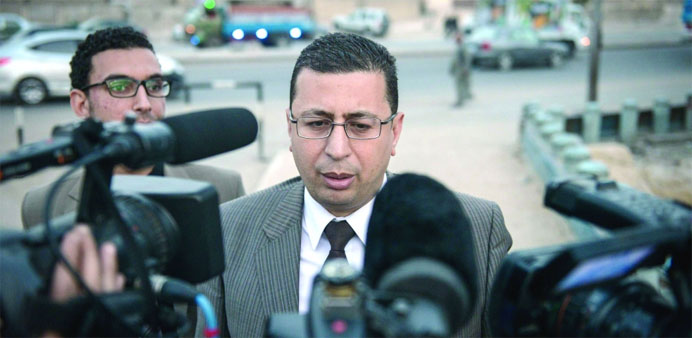Mukhlis el-Salhy, the lawyer of one of the three Al Jazeera journalists on trial, speaks to the press prior to the hearing in Cairo yesterday.
AFP/Cairo
An Egyptian court heard new prosecution evidence, including audio tapes, yesterday in the trial of Al Jazeera journalists accused of links with the banned Muslim Brotherhood, but defence lawyers complained they were inaudible.
Prosecutors allege that the journalists and their Egyptian collaborators had colluded with the Brotherhood movement of ousted president Mohamed Mursi and falsely sought to portray Egypt as being in a state of “civil war” since his overthrow by the army last July.
But the defendants—eight of whom are in custody in a case that has drawn criticism from media organisations around the world—deny any link to the now terror-blacklisted Islamist group and insist they were merely gathering news.
At yesterday’s seven-hour hearing, prosecutors presented audio recordings of three Egyptian defendants who allegedly provided video footage of pro-Mursi demonstrations to the network’s Egyptian arm, Al Jazeera Mubashir Misr.
Defence lawyers complained they were unable to hear the recordings due to their poor quality.
“If anyone understands the content, please inform us,” one of the lawyers told the judges.
One judge responded: “I can hear it from my side”.
Prosecutors also submitted photographs of maps said to be of the area around the embassy of the UAE -the scene of several pro-Mursi protests ¬- and leaflets calling for protests.
Photographs also showed bodies on the ground covered in blankets.
Australian Peter Greste—one of three Al Jazeera English journalists who have spent more than 100 days in custody—said that it was another day of “meaningless” prosecution evidence.
“The case turns to be an abuse against journalism and freedom of speech,” he told AFP during a recess.
Egyptian-Canadian Mohamed Fadel Fahmy, who was Al Jazeera’s Cairo bureau chief, said: “If these are the evidences, we should see all journalists in the world on trial.”
Fahmy, who has complained of a shoulder injury that existed before his arrest in December, requested the court’s permission to have medical treatment.
“I have been prescribed three physiotherapy sessions in prison, and I exercise in my cell,” he told the judges.
“I am sure I will be acquitted but I don’t want to lose my hand. Allow me to be transferred for treatment to a private hospital at my own expense because it is impossible to get treatment in prison.”
The court ordered that he be provided medical treatment in prison.
Five Egyptian defendants told AFP they were neither Mursi supporters nor Brotherhood members, but were against the military’s overthrow of the Islamist president.
One of them said he had provided video footage to Al Jazeera Arabic.
The five said that prior to their detention they had not known the three Al Jazeera English journalists—Greste, Fahmy and producer Baher Mohamed.
At the trial’s last hearing, prosecutors had presented video footage and an array of photographs with no apparent link to the case.
The court set the next hearing for May 3.

